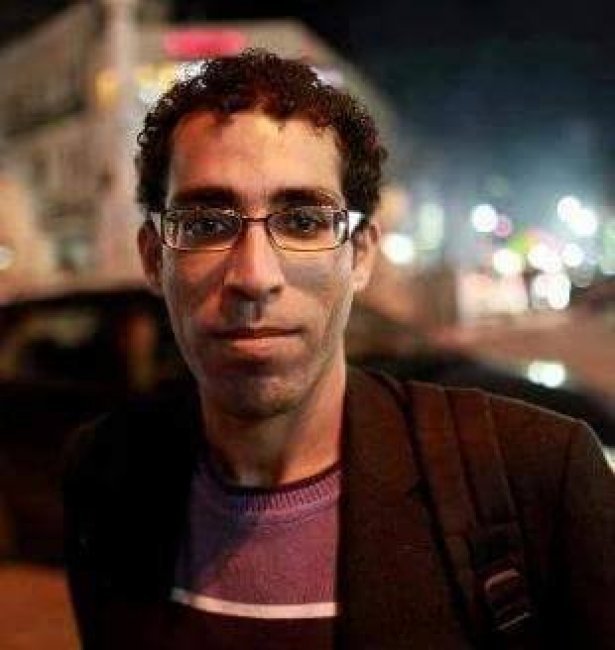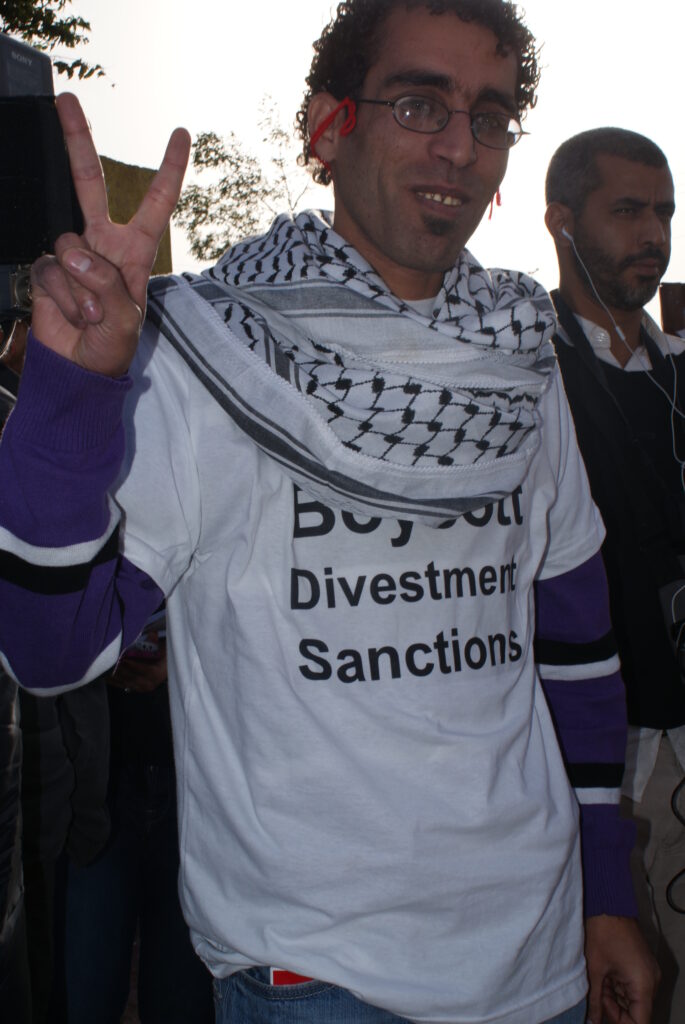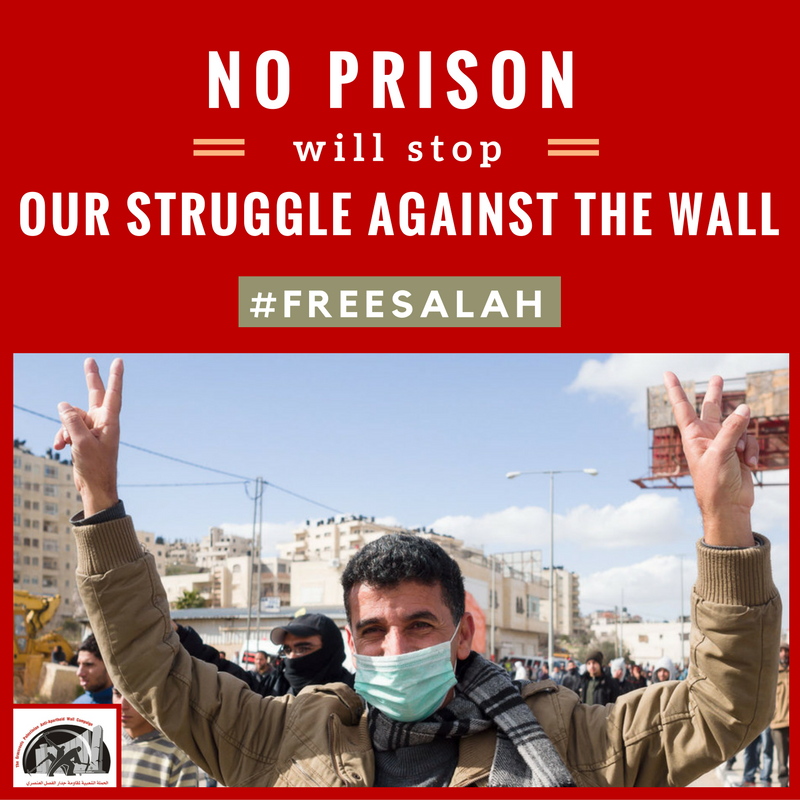
Basil al-Araj stood “with his gun in one hand and his pen in the other, a solid, conscious fighter who would not compromise one iota on principles or constants and who did not melt like some intellectuals in the acid of temptations or acceptance of the status quo,” said imprisoned Palestinian leader Ahmad Sa’adat, the general secretary of the Popular Front for the Liberation of Palestine, the Palestinian leftist party, in a statement from Israeli prison on the assassination of the Palestinian youth leader by attacking Israeli occupation forces on Monday, 6 March.
Al-Araj “gave his life for Palestine at a time when some traders seek to sell it piece by piece. He never fell or wavered before the rubble of reality, the enormous challenges, the attempts to liquidate the Palestinian cause or divert it from its natural course…His experience of struggle and rich cultural work is an inspiration and compass for revolutionary Palestinian youth, and his luminous flame illuminates their struggle and uprising,” said Sa’adat.
 As Sa’adat spoke from prison and Palestinians took to the streets, the Palestinian Prisoners Affairs Commission filed a petition in Israeli occupation courts in Jerusalem for the release of Al-Araj’s body. The Palestinian youth activist, 32, was gunned down in a massive assault by Israeli occupation forces on Monday morning, 6 March, in el-Bireh. Al-Araj’s family said that they received notice from the occupation authorities said they would only transfer his body if his memorial will not be held in his family hometown of al-Walaja, for the protection of nearby illegal occupation settlements.
As Sa’adat spoke from prison and Palestinians took to the streets, the Palestinian Prisoners Affairs Commission filed a petition in Israeli occupation courts in Jerusalem for the release of Al-Araj’s body. The Palestinian youth activist, 32, was gunned down in a massive assault by Israeli occupation forces on Monday morning, 6 March, in el-Bireh. Al-Araj’s family said that they received notice from the occupation authorities said they would only transfer his body if his memorial will not be held in his family hometown of al-Walaja, for the protection of nearby illegal occupation settlements.

Protests rang out in Palestine and the refugee camps in memory of Al-Araj on Monday, in Ramallah, el-Bireh, Haifa, Dheisheh refugee camp and elsewhere, including Nahr el-Bared camp in Lebanon. Protesters denounced the killing of Al-Araj, a beloved youth leader and demanded an end to Palestinian Authority security coordination with the Israeli occupation.

He was brutally shot down in a hail of bullets in an assassination raid by Israeli occupation forces after being pursued for months and his family home repeatedly raided. Al-Araj was a prominent Palestinian youth activist involved in grassroots organizing, cultural preservation and Palestinian oral history and writing and theorizing about Palestinian resistane and the future of the liberation struggle. The Palestine Chronicle quoted al-Araj, “If you want to be an intellectual, you have to be an engaged intellectual, and if you refuse to do so, it is no use to be intellectual.”
 He and five of his friends and comrades were imprisoned by the Palestinian Authority for months without charge after PA President Mahmoud Abbas boasted of their arrest and the value of PA security coordination with the Israeli occupation. After a hunger strike and widespread support, they were released from PA prison; however, they were then pursued by the Israeli occupation. Four of al-Araj’s fellow hunger strikers, Mohammed al-Salameen, Seif al-Idrissi, Haitham Siyaj and Mohammed Harb, are currently imprisoned without charge or trial under Israeli administrative detention. The integral role of PA security coordination in the pursuit, arrest and now murder of al-Araj was reflected in the chants and demands of protesting Palestinians. On Tuesday, 7 March, a protest will gather in Beirut outside the Palestinian embassy to demand an end to security coordination as a crime against the Palestinian people after the extrajudicial execution of al-Araj.
He and five of his friends and comrades were imprisoned by the Palestinian Authority for months without charge after PA President Mahmoud Abbas boasted of their arrest and the value of PA security coordination with the Israeli occupation. After a hunger strike and widespread support, they were released from PA prison; however, they were then pursued by the Israeli occupation. Four of al-Araj’s fellow hunger strikers, Mohammed al-Salameen, Seif al-Idrissi, Haitham Siyaj and Mohammed Harb, are currently imprisoned without charge or trial under Israeli administrative detention. The integral role of PA security coordination in the pursuit, arrest and now murder of al-Araj was reflected in the chants and demands of protesting Palestinians. On Tuesday, 7 March, a protest will gather in Beirut outside the Palestinian embassy to demand an end to security coordination as a crime against the Palestinian people after the extrajudicial execution of al-Araj.
Al-Akhbar newspaper in Lebanon reported that al-Araj rented an apartment from a foreigner in el-Bireh for two and a half months while he was incessantly pursued, especially in his hometown of al-Walaja in Bethlehem, by occupation forces. His father said that the family predicted Basil’s killing after the threats of occupation forces if he did not give himself up. He had with him a large number of books and magazines, including books by Antonio Gramsci, “Palestine Studies’ magazine, the novel, “Al-Moskobiyeh” and the Qur’an. Al-Araj resisted and fought back against the invading forces until his last breath.
 Palestinian political parties widely denounced the assassination of al-Araj. “The martyr Basil Al-Araj was a freedom fighter, intellectual and theorist of the uprising of Palestinian youth. He was dedicated to a path of resistance, intifada, unity, return and liberation of the entire land of Palestine. He was a revolutionary intellectual who put all of his cultural and intellectual energies in the service of the resistance together with his own actions on the ground, confronting security coordination and collaboration.
Palestinian political parties widely denounced the assassination of al-Araj. “The martyr Basil Al-Araj was a freedom fighter, intellectual and theorist of the uprising of Palestinian youth. He was dedicated to a path of resistance, intifada, unity, return and liberation of the entire land of Palestine. He was a revolutionary intellectual who put all of his cultural and intellectual energies in the service of the resistance together with his own actions on the ground, confronting security coordination and collaboration.
The assassination of the martyr struggler Basil al-Araj is the ugly fruit of the continuation of security coordination. Basil al-Araj and his comrades were chased by the Palestinian Authority security apparatus and were imprisoned for several months, and this detention was directly followed by the occupation’s hunt for him until his death,” said the Popular Front for the Liberation of Palestine.
Hamas spokesperson Hazem Kassem said that “the martyrdom of Basil al-Araj is the embodiment of resistance of the youth of the West Bank in the Jerusalem intifada, expressing their rejection of compromise and acquiescence to the occupation, or the illusion that the relationship of the Palestinians and the occupation is normalized or a relationship of security and negotiations.” Islamic Jihad issued a statement saying that “the martyr al-Araj was an exceptional struggler, alongside all free palestinian youth, struggling to bring an end to the occupation of our land,” denouncing the role of the PA and noting “the suffering of thousands of detainees in the prisons of the Palestinian Authority who have been arrested and detained by the hands of their own countrymen…betting falsely on settlement.” Fatah spokesperson Ziyad Khalil Abu Zayyad denounced the killing of al-Araj as “another escalation (by Israel) against Palestinians,” calling it a “hideous act of the occupation.”
Araj’s will, written to be released if he was slain by occupation forces, was translated by Ma’an News:
“Greetings of Arab nationalism, homeland, and liberation,
If you are reading this, it means I have died and my soul has ascended to its creator. I pray to God that I will meet him with a guiltless heart, willingly, and never reluctantly, and free of any whit of hypocrisy….How hard it is to write your own will. For years I have been contemplating testaments written by martyrs, and those wills have always bewildered me. They were short, quick, without much eloquence. They did not quench our thirst to find answers about martyrdom. Now I am walking to my fated death satisfied that I found my answers. How stupid I am! Is there anything which is more eloquent and clearer than a martyr’s deed? I should have written this several months ago, but what kept me was that this question is for you, living people, and why should I answer on your behalf? Look for the answers yourself, and for us the inhabitants of the graves, all we seek is God’s mercy.”
 On his 33rd day of hunger strike, Friday, 10 March, imprisoned Palestinian journalist Mohammed al-Qeeq announced the suspension of his strike with an agreement for his release in mid-April, three months after his arrest on 15 January by Israeli occupation forces.
On his 33rd day of hunger strike, Friday, 10 March, imprisoned Palestinian journalist Mohammed al-Qeeq announced the suspension of his strike with an agreement for his release in mid-April, three months after his arrest on 15 January by Israeli occupation forces.
 To mark International Women’s Day, Inminds human rights group will on Friday 10th March 2017 hold a vigil on the Southbank of the river Thames in London to highlight the plight of Palestinian women prisoners in Israeli occupation jails, and to demand their freedom.
To mark International Women’s Day, Inminds human rights group will on Friday 10th March 2017 hold a vigil on the Southbank of the river Thames in London to highlight the plight of Palestinian women prisoners in Israeli occupation jails, and to demand their freedom. Responding to the call of
Responding to the call of  Organizers in Beirut
Organizers in Beirut 
 As Sa’adat spoke from prison and Palestinians took to the streets, the Palestinian Prisoners Affairs Commission
As Sa’adat spoke from prison and Palestinians took to the streets, the Palestinian Prisoners Affairs Commission 

 He and five of his friends and comrades were imprisoned by the Palestinian Authority for months without charge after PA President Mahmoud Abbas
He and five of his friends and comrades were imprisoned by the Palestinian Authority for months without charge after PA President Mahmoud Abbas  Palestinian political parties widely denounced the assassination of al-Araj. “The martyr Basil Al-Araj was a freedom fighter, intellectual and theorist of the uprising of Palestinian youth. He was dedicated to a path of resistance, intifada, unity, return and liberation of the entire land of Palestine. He was a revolutionary intellectual who put all of his cultural and intellectual energies in the service of the resistance together with his own actions on the ground, confronting security coordination and collaboration.
Palestinian political parties widely denounced the assassination of al-Araj. “The martyr Basil Al-Araj was a freedom fighter, intellectual and theorist of the uprising of Palestinian youth. He was dedicated to a path of resistance, intifada, unity, return and liberation of the entire land of Palestine. He was a revolutionary intellectual who put all of his cultural and intellectual energies in the service of the resistance together with his own actions on the ground, confronting security coordination and collaboration. Palestinian administrative detainee
Palestinian administrative detainee  Hunger-striking Palestinian administrative detainee
Hunger-striking Palestinian administrative detainee  Palestinian prisoners’ institutions, the Palestinian Prisoners’ Society, Al-Mezan Center for Human Rights, the Prisoners’ Affairs Commission and the Addameer Prisoner Support and Human Rights Association,
Palestinian prisoners’ institutions, the Palestinian Prisoners’ Society, Al-Mezan Center for Human Rights, the Prisoners’ Affairs Commission and the Addameer Prisoner Support and Human Rights Association, 

 Palestinian human rights defender and boycott activist
Palestinian human rights defender and boycott activist 